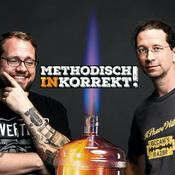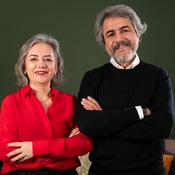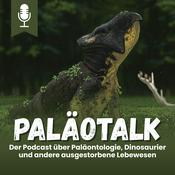345 Episoden
- National Geographic photographer Kiliii Yuyän returns to the Mongabay Newscast to share his experience creating his new book, Guardians of Life: Indigenous Knowledge, Indigenous Science, and Restoring the Planet from specialty publisher Braided River. This book documents the traditional ecological knowledge (TEK) of nine Indigenous communities worldwide, featuring contributions and essays from many members of these communities, along with Yüyan's own photography.
TEK, Yüyan says, isn't exactly traditional so much as it is ecological knowledge that is place-based. While it draws on thousands of years of knowledge, it also innovates in society as we know it, and can offer social, cultural and ecological benefits that neoliberal economics does not.
Yüyan highlights that some of the most significant environmental victories of the past few years, such as the removal of the Klamath River dams in the United States — the largest dam removal project ever — were led by Indigenous people. Yüyan's imagery captures the essence of the decades it took for Lisa Moorehead-Hillman, Leaf Hillman and others to advocate for their removal.
"I think what the great power of the book is in a lot of ways is the power of photography … actually seeing it. That this is what it means when we're talking about what is shamanism, what does it mean when you remove a dam … and you see it in people's faces."
Please take a minute to let us know what you think of our podcast, here.
Mike DiGirolamo is the host & producer for the Mongabay Newscast based in Sydney. Find him on LinkedIn and Bluesky.
Image Credit: Lisa Morehead-Hillman and Leif Hillman, both Karuk, celebrate the removal of the dams on the newly exposed reservoir floor in 2024. The former head of the Karuk Natural Resources Department, Leif spent two decades working with other Indigenous groups, environmental organizations and government officials to bring back the Klamath River. Image courtesy of Kiliii Yüyan.
—-
Timecodes
(00:00) What is traditional ecological knowledge?
(08:00) When values and governance go together
(17:38) Why and when hunters share their bounty in Greenland
(27:26) In Mongolia ceremonies are conservation
(39:12) How to get a dam removed
(46:08) Why the buffalo is the best environmentalist Lessons from 60 years of USAID development projects have been saved by this company
10.2.2026 | 39 Min.A year ago, U.S. President Donald Trump shut down public access to the Development Experience Clearinghouse, a $30 billion database holding 60 years' worth of institutional knowledge from more than 150,000 projects administered by the U.S. Agency for International Development. But before the closure, former USAID employee and artificial intelligence scientist Lindsey Moore used a large language model (LLM) to read all of the information in this database — rescuing critical lessons on development, environmental, economic and social projects in countries across the globe, all documented by USAID.
The data also included information on conservation projects. Many of the challenges presented in these projects repeated over the years, but the lessons were rarely retained — something Moore's tech startup, DevelopMetrics, hopes to change.
Moore joins this week's podcast to explain what those lessons are and what conservationists can learn from them. DevelopMetrics deploys an AI model capable of understanding not just the information from USAID's database, but also other public databases that could be at risk of deletion or being lost to time.
Please take a minute to let us know what you think of our podcast, here.
Mike DiGirolamo is the host & producer for the Mongabay Newscast based in Sydney. Find him on LinkedIn and Bluesky.
Banner image: Mangroves on Vanua Levu Island, Fiji. Image by Rhett A. Butler/Mongabay.
——
Timecodes
(00:00) Lindsey's background with USAID
(04:14) How to analyze 60 years of data
(11:07) Uncovering hidden lessons
(14:24) 1. Bring delivery closer to households
(16:43) 2. Practice changes practice
(19:19) 3. Design for scale, not for pilots
(24:08) 4. Co-creation beats consultation
(26:30) 5. Strengthen the middle layer
(30:56) Who DevelopMetrics works with and how they are funded
(32:58) Energy and water costs of LLMs- It's been more than half a century since the publication of Silent Spring by the scientist and creative writer Rachel Carson. The seminal volume caught the attention of U.S. presidents, artists and musicians, spurring the environmental movement and leading to the eventual ban of the toxic pesticide DDT.
Joining the Mongabay Newscast is environmental writer and director of the creative writing program at Middlebury College, Megan Mayhew Bergman. She unpacks the impact of Carson's work, which came under public attack from chemical companies seeking to discredit her, and how, eventually, the truth broke through.
"We don't change our minds usually based on data. We change our minds based on emotion, but historically, it's been pretty taboo for scientists to include emotion in the way that they write. And I feel like Carson risked that here in a way that was really powerful."
Please take a minute to let us know what you think of our podcast, here.
Image: Megan Mayhew Bergman. Image by Cameron Russell.
Environmental writing and authors mentioned in this conversation:
Braiding Sweetgrass by Robin Wall Kimmerer
Florida by Lauren Groff
The Home Place by J. Drew Lanham
Hope Is the Thing With Feathers by Christopher Cokinos
How Strange a Season by Megan Mayhew Bergman
Silent Spring by Rachel Carson
Under a White Sky by Elizabeth Kolbert
Vesper Flights by Helen Macdonald
The Wild Flag by E.B. White
Zora Neale Hurston
Other works and authors mentioned:
Ecology of a Cracker Childhood by Janisse Ray
Men We Reaped by Jasmyn Ward
A Small Place by Jamaica Kincaid
Speak Memory by Vladimir Nabokov
—-
Timestamps
(00:00) Changing hearts and minds
(02:46) Rachel Carson's journey to Silent Spring
(08:22) Controversy and impact
(14:40) Room for a new voice
(20:55) Bioaccumulation and what it means
(24:07) "We don't change our minds based on data"
(26:43) Recommended reads
(35:21) The American South and environmental writing
(39:57) Lessons for writers Massive decline of European olive groves harms nature and culture, but solutions exist
27.1.2026 | 29 Min.Across Mediterranean Europe, olive groves are in decline from a range of factors, from disease to depopulation. In Italy alone, there are roughly 440 million abandoned olive trees, and the ecological, cultural and socioeconomic impacts from the loss are devastating, explains the latest guest on the Mongabay Newscast. Still, solutions exist to help turn the tide of this under-discussed problem.
Federica Romano is the program coordinator and UNESCO Chair on Agricultural Heritage Landscapes at the University of Florence. On this episode of the Mongabay Newscast she discusses the drivers of the degradation and abandonment of olive groves, how ecological factors and human-induced climate change exacerbate these, and the consequences for biodiversity and wildlife in Europe, where olive oil isn't just an economic institution, but also a significant cultural one.
"Olive groves hold [a] deep cultural significance that goes far beyond agriculture [and] food production across Europe," she says. "Olive trees have symbolized peace, resilience and continuity through thousands of years, appearing in religious contexts, but also in arts and historical narratives."
The Mongabay Newscast is available on all major podcast platforms, including Apple and Spotify, and previous episodes are also accessible at our website's podcast page.
Please take a minute to let us know what you think of our podcast, here.
Mike DiGirolamo is the host & producer for the Mongabay Newscast based in Sydney. Find him on LinkedIn and Bluesky.
——-
Timecodes
(00:00) Intro
(01:52) The degradation and abandonment of olive groves
(03:27) Ecological and cultural importance
(07:14) Rural depopulation
(11:00) Environmental threats to olive groves
(15:32) Solutions and adoption schemes
(17:29) Agroforestry and agroecology solutions
(24:03) Fake olive oil
(25:40) How you can help- Professional drag artist and environmental activist Pattie Gonia has more than 2 million followers on Instagram and has raised $1.2 million for environmental nonprofits by hiking 100 miles, or 160 kilometers, in full drag into San Francisco. She has gained international recognition for using drag artistry to advocate for the environment, in acknowledgment and celebration of hundreds of researchers and scientists in the field who identify as queer.
She joins Mongabay's podcast to explain why joy is a fundamental ingredient missing in the environmental advocacy space, how she prioritizes it in her work as a drag performer and activist, and why she feels the environmental movement must prioritize it to succeed.
"If we want people to join this movement, we have to make it freaking fun," she says.
The Mongabay Newscast is available on all major podcast platforms, including Apple and Spotify, and previous episodes are also accessible at our website's podcast page.
Please take a minute to let us know what you think of our podcast, here.
Hear our top 10 most listened to podcasts from 2025, here.
Image Credit: Pattie Gonia. Image courtesy of Pattie Gonia.
——
Timecodes
(00:00) Hiking 100 miles in drag for the climate
(04:50) The origins of Pattie Gonia
(12:53) Looking at science through a lens of humanity
(16:38) On drag artistry and nature
(21:10) Bridging the gap between culture and nature
(26:19) What can we build instead of burn?
(35:22) "We have to make it freaking fun"
Weitere Wissenschaft Podcasts
Trending Wissenschaft Podcasts
Über Mongabay Newscast
News and inspiration from nature's frontline, featuring inspiring guests and deeper analysis of the global environmental issues explored every day by the Mongabay.com team, from climate change to biodiversity, tropical ecology, wildlife, and more. The show airs every other week.
Podcast-WebsiteHöre Mongabay Newscast, Aha! Zehn Minuten Alltags-Wissen und viele andere Podcasts aus aller Welt mit der radio.de-App

Hol dir die kostenlose radio.de App
- Sender und Podcasts favorisieren
- Streamen via Wifi oder Bluetooth
- Unterstützt Carplay & Android Auto
- viele weitere App Funktionen
Hol dir die kostenlose radio.de App
- Sender und Podcasts favorisieren
- Streamen via Wifi oder Bluetooth
- Unterstützt Carplay & Android Auto
- viele weitere App Funktionen


Mongabay Newscast
Code scannen,
App laden,
loshören.
App laden,
loshören.








































